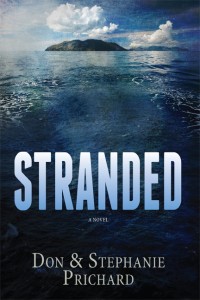Today, Stephanie Pritchard talks about creating suspense in a novel. I just finished reading her book Stranded: A Novel. She’s knows about suspense. So take a look at what she has to say about it here. And leave a comment for a chance to get a free copy of her book – and see how she does suspense.
novel. I just finished reading her book Stranded: A Novel. She’s knows about suspense. So take a look at what she has to say about it here. And leave a comment for a chance to get a free copy of her book – and see how she does suspense.
Stephanie — I recently read a popular novel that had no conflict in it. Not until Chapter 17 anyway.
The novel was my book club’s selection of the month, and I was curious to hear if any members agreed with me. I’m the only author among them, so their perspectives as “readers only” are often enlightening.
Most of the members concurred with me. “I kept waiting for something bad to happen to the main character,” one gal said. “Instead, things kept getting better and better for him. At last I just relaxed and figured I didn’t need to worry about him.”
So, what kept us reading? Answers included (1) the writing was good, (2) it was pleasant to read a book that ambled instead of bucking us off at every chapter, (3) secrets piqued our curiosity, (4) surely some kind of conflict would eventually emerge.
We agreed that the conflict at Chapter 17 got us to (finally) sit on the edge of our seats. The story definitely got exciting there—helped by the contrast of having been so dull … er, serene, up until that point.
A few members insisted conflict existed in the story from beginning to end. The protagonist encountered problems, they insisted—it was just that he overcame them with ease and always ended up with some kind of advantage.
That led to a discussion of what is “conflict”? We agreed it was an obstruction to a goal, but that the goal’s intensity—or lack of it—placed the conflict on a spectrum. In this particular novel, the intensity was mild. Why? Because the protagonist’s overarching goal (recovery from a wound) was not fought for but simply hoped for. Basically, he acquiesced to the expectation of death. Therefore, minimum effort on his part equaled minimum intensity in anything that happened.
Here’s some of the takeaway I gleaned as a suspense novelist:
- Doubt as to the outcome of a conflict increases tension. With our book club’s protagonist overcoming obstacles so easily, we readers felt no tension until Chapter 17. As a suspense writer, I need to create doubt by making obstacles tough to overcome—postponing solutions for some of them and making sure the protagonist’s progress becomes increasingly difficult.
- A character’s drive affects conflict. The protagonist in our book club novel was resigned to defeat from the very beginning. Circumstances rather than motivation led to his eventual victory. As a suspense writer, I don’t want a passive hero. I need to make his grit move the story along. External circumstances should obstruct him, not make him the lucky winner of the lottery.
- The adversary affects the degree of conflict. Our book club hero didn’t face an adversary until Chapter 17. Instead of using an antagonist, the author used secrets to entice the reader to keep reading. While employing secrets is an effective tool, as a suspense writer I need a strong adversary at war with my protagonist to keep my readers biting their nails. My hero can’t win easily or all the time or without cost.
 The story question should ricochet off the conflict. The story question in our book club novel is “Will the protagonist’s wound heal?” In my novel, Stranded, the story question is “Will the castaways get off the island?” Admittedly, both questions sound lame (as story questions are wont to do). Conflict is what gives life to the lame—what feeds it, sustains it, makes it burst at the seams. Or not.The nature of the conflict in our book club novel made the story, well, trickle pleasantly along. In contrast, if you look at the reviews of Stranded: A Novel on Amazon, you will see the readers found the book hard to put down.Okay, curious as to what the novel is that I referred to throughout this article? It’s Keeper of the Bees by Gene Stratton Porter. It’s a worthy classic. Full of optimism. A sweet read. If you’re looking for that kind of fulfillment in reading, you won’t be disappointed by this book.But if you want action and suspense, try Stranded: A Novel Uh-huh, lick your fingers and get ready to turn those pages fast!
The story question should ricochet off the conflict. The story question in our book club novel is “Will the protagonist’s wound heal?” In my novel, Stranded, the story question is “Will the castaways get off the island?” Admittedly, both questions sound lame (as story questions are wont to do). Conflict is what gives life to the lame—what feeds it, sustains it, makes it burst at the seams. Or not.The nature of the conflict in our book club novel made the story, well, trickle pleasantly along. In contrast, if you look at the reviews of Stranded: A Novel on Amazon, you will see the readers found the book hard to put down.Okay, curious as to what the novel is that I referred to throughout this article? It’s Keeper of the Bees by Gene Stratton Porter. It’s a worthy classic. Full of optimism. A sweet read. If you’re looking for that kind of fulfillment in reading, you won’t be disappointed by this book.But if you want action and suspense, try Stranded: A Novel Uh-huh, lick your fingers and get ready to turn those pages fast!- JIM: Good advice Stephanie. And readers, leave even a short comment and we’ll put your name into the drawing for a free copy of Stephanie’s book, and see how she throws in the suspense. It’s a good read.
You can find out more about her book on Amazon at: http://amzn.to/1x6WOVU

Although I loved the entire post, this was my favorite line. “Admittedly, both questions sound lame (as story questions are wont to do).” I always feel that way about my story questions. It’s wonderful to see that I’m not alone. =op
Oh, I know exactly what you mean, Lora! I SO dislike having to give a simple description like the story question for my book! Like, who in the world would read it after that?
Thanks for sharing the perspective of members of your book club, Stephanie.
“That led to a discussion of what is “conflict”? We agreed it was an obstruction to a goal, but that the goal’s intensity—or lack of it—placed the conflict on a spectrum.”
I really appreciated hearing that from readers. We work so hard at making conflict worthy of our characters and story. It’s nice to know it’s appreciated.
You also said “The adversary affects the degree of conflict.”
That point particularly resonated with me. As a person, I tend to avoid conflict so I work hard at strengthening it in my stories. It helps that my editor is very demanding about conflict being ever-present.
Thanks for a fascinating post.
You mentioned “tension,” Mary. It’s another important element in creating a gripping read. A scene can have just one conflict (obstacle to a goal) but using tension that increases its “pinch” as the scene moves along can make that single conflict seem more alive, more 3-dimensional, more doggone ouchy. Hmmmm, maybe I should write an article on tension someday for JIm!
Isn’t it interesting that some of the classics, even mystery classics, would have a difficult time getting published today, and why is that? It appears what the publishing industry and the public wants and expects is different now than it was years ago. So what has changed us? Is it TV and movies making us impatient in our reading, the threatening world we live in today, perhaps our hectic lifestyle? Perhaps all have contributed to this change in taste. I admire authors who can write thrillers and suspense and you have provided an excellent discussion of conflict here, and one I’ll keep in mind for my own writing. Thank you for your insight.
I’m sure someone had done a study on that, Lesley, but I suspect you’ve hit the biggies. I used to love reading classics, but now I find myself wanting to speed along and can hardly stand the story making me dawdle. I think another contributing factor is that contemporary writers have learned to write in a much more dynamic way (fewer adjectives and adverbs, strong nouns, powerful verbs, etc.) and it stimulates us to crave a faster-paced story much like sugar added to our food puts us into the fast lane. I do have dawdiling stories I love, though, like The No. 1 Ladies’ Detective Agency series. 🙂
I’d be willing to bet Porter would have a tough time finding a publisher for this novel today. I agree with Jim and Earl–you’re not going to hold most readers without conflict/suspense from the start.
Yes, a lot of classics wouldn’t make the grade now, but maybe that will be the fate of today’s writers down the road too. Eeek!
Stephanie, I enjoyed your post. I love to read mystery/suspense novels and I write the Malone mystery series, where I strive to create suspense, both physical and psychological.
“Stranded” sounds intriguing so please enter to me to win a copy.
Thanks, Patricia. I’ll have to take a look at your Malone series. 🙂
Very good advice, basic to writing suspense fiction. I would add one thought: Grab the reader in the first paragraph. Mine from “Deadly Additive” won a contest for openers a few years ago: “By habit, Jeb Sledge disapproved of people who pointed weapons at him. The present offender’s tuxedo did not qualify him for an exception, and the silencer on his pistol ony aggravated the offense.” Please put me in the drawing for a copy of “Stranded.”
LOL, Donn, I can see why that opener would be a winner! Grabbers are good, but I find there are many excellent ways to open a novel.
I have to agree with Earl – spot on about suspense. I’ve read Stephanie’s book and it is chock full of suspense. She understands the “she’s been saved from disaster – only to face another.” Good job, Stephanie.
Very interesting, Stephanie. Everything you said about suspense and conflict make perfect sense and I’ve never heard it expressed so well. Good job.
Thanks, Earl. Sometimes seeing a contrast helps me understand a concept better. Keeper of Bees definitely did that for me!